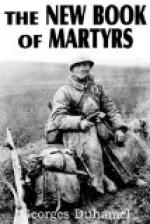XXVII
At the edge of the beetroot field, a few paces from the road, in the white sand of Champagne, there is a burial-ground.
Branches of young beech encircle it, making a rustic barrier that shuts out nothing, but allows the eyes and the winds to wander at will. There is a porch like those of Norman gardens. Near the entrance four pine-trees were planted, and these have died standing at their posts, like soldiers.
It is a burial-ground of men.
In the villages, round the churches, or on the fair hill-sides, among vines and flowers, there are ancient graveyards which the centuries filled slowly, and where woman sleeps beside man, and the child beside the grandfather.
But this burial-ground owes nothing to old age or sickness. It is the burial-ground of young, strong men.
We may read their names on the hundreds of little crosses which repeat daily in speechless unison: “There must be something more precious than life, more necessary than life ... since we are here.”
THE DEATH OF MERCIER
Mercier is dead, and I saw his corpse weep. ... I did not think such a thing possible. The orderly had just washed his face and combed his grey hair.
I said: “You are not forty yet, my poor Mercier, and your hair is almost white already.”
“It is because my life has been a very hard one, and I have had so many sorrows. I have worked so hard ... so hard! And I have had so little luck.”
There are pitiful little wrinkles all over his face; a thousand disappointments have left indelible traces there. And yet his eyes are always smiling; from out his faded features they shine, bright with an artless candour and radiant with hope.
“You will cure me, and perhaps I shall be luckier in the future.”
I say “yes,” and I think, “Alas! No, no.”
But suddenly he calls me. Great dark hollows appear under the smiling eyes. A livid sweat bathes his forehead.
“Come, come!” he says. “Something terrible is taking hold of me. Surely I am going to die.”
We busy ourselves with the poor paralysed body. The face alone labours to translate its sufferings. The hands make the very slightest movement on the sheet. The bullets of the machine-gun have cut off all the rest from the sources of life.
We do what we can, but I feel his heart beating more feebly; his lips make immense efforts to beg for one drop, one drop only from the vast cup of air.
Gradually he escapes from this hell. I divine that his hand makes a movement as if to detain mine.
“Stay by me,” he says; “I am afraid.”
I stay by him. The sweat no longer stands on his brow. The horrible distress passes off. The air flows again into the miserable breast. The gentle eyes have not ceased to smile.




